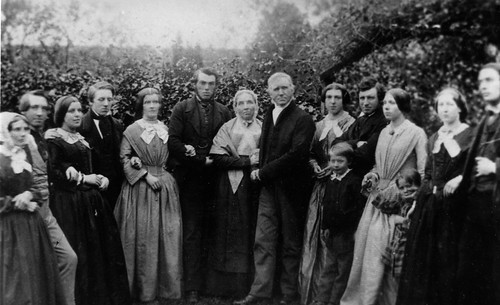My great great great uncle John Bayliff Bowman lived at Summer Hill, near Monyash in the County of Derby.
The Bowman family, who were Quakers, had three farms, One Ash Grange [which John Bayliff Bowman often referred to as O.A.], Cales and Summer Hill [which he usually referred to as S.Hill or S.H.]
John Bayliff Bowman is fourth from the left in the photo below ...
The Bowman family, who were Quakers, had three farms, One Ash Grange [which John Bayliff Bowman often referred to as O.A.], Cales and Summer Hill [which he usually referred to as S.Hill or S.H.]
John Bayliff Bowman is fourth from the left in the photo below ...
A Farm Journal continues :~
[no entry for the 16th August 1869]
3 - 17 Fine - packed One Ash wool
4 - 18 Fine Jos[eph] & I to Haddon Hall & to One Ash for tea
5 - 19 Fine Farnsworth sale Monyash - Jos[eph] & I to Middleton in even[in]g
6 - 20 Ditto Jos[eph] & I & Co[u]s[in] Eliza to Ashford Jos[eph] to meet the 7.40 train - bo[ugh]t tup of John Brassington 6.10/-
7 - 21 Fine F & R.A. & Co[u]s[in] Augusta Hall [Hull ?] to tea - parted ewes 4 barren cows from Bro[ther] Wm £50 to S.H. want a little rain
1 - 22 Fine
2 - 23 Ditto - to Middleton with Eureka mower to fit at Wms
3 - 24 Ditto very hot at Middleton finish mach[ine] & bro[ugh]t to Intake End & began to mow thistles & windles - sold 3 bulls to Tho[ma]s Grindy
4 - 25 Ditto finish[e]d mow[in]g Intake End cut[tin]g thistles etc to B[akewe]ll to tea at Jos[eph]
5 - 26 B[akewe]ll Fair cheese low - sheep & beasts slow - sold 83 lambs to John Kirkam 24/- 3 for luck - taking the whole of my wether lambs
6 - 27 Ditto weather very hot indeed but a heifer of E.B. [my great great grandfather Ebenezer Bowman ?] calved this even[in]g Bowman Bloore to tea with a young American named Ashmore
7 - 28 Tremendous hot finish[e]d lead[in]g the hay out of Intake end bone dust for sow[in]g Rye & wheat
1 - 29 Very cold N.E. wind very sudden change from yest[erda]y
2 - 30 cold E. wind B[akewe]ll market - began to cut corn in Watricle & Seed Piece S.H.
3 - 31 Fine day W.E.
I am sure that anyone reading this will be thinking, why did he go to Haddon Hall. John was a tenant of the Chatsworth Estate, the Dukes of Devonshire. Now [as some of you will know] just over the other side of the hill is the Haddon Estate, the Dukes of Rutland. Perhaps he was just going to have a look around though John didn't seem to go anywhere without there being a 'business' element.
If only he had gone into more detail.


He seems to have a very busy social life,I also wondered why he went to Haddon Hall. Perhaps they also rented land out the same as Chatsworth.Any idea what a windle is Charlie.Ann
ReplyDeleteI don't know what a windle is Ann. I assume it's a country name for a particular weed ...
DeleteI wonder what breeds of sheep he was having... I just washed some English Leicester locks today, getting it ready for the spinning wheel to make some nice yarn.
ReplyDeleteYes, it does make you wonder. We've also wondered what sort of cheese he made. There are some Derbyshire Gritstone sheep and I know his nephew [or great nephew] Cornelius Henry Bowman won prizes with them.
DeleteThat was quite a remarkable change in weather in the space of 24 hours. Perhaps sudden extreme changes in weather aren't such a new thing as some would believe.
ReplyDeleteIt came as a surprise to me too Mitch whilst I was typing up the entries on here. It seems to have gone from far too much hear to "very cold" almost overnight.
DeleteI agree that there was always some work or business involved in all activities. There still is today for farming folk. He would not have understood modern folk who go to gyms for exercise. I have trouble with it too. Why don't you just go pull some weeds, cut an old person's lawn, or help at a soup kitchen, or scrub a shut-in's floor? It costs less, but I guess it is not as glamorous.
ReplyDeleteI think some people have to dress to impress Karyn ...
DeleteWindles would be the odd pieces of grass gone to seed etc that the animals had left.
ReplyDeleteThink a good chance at that time the Border Leicester Sheep had been improved a lot and the sheep were that breed.
Derbyshire Gritstones were a really hard breed for the moorland and although they could be used of course on better pastures they would never produce as many lambs and the lambs would grow slower and not so good in quality.
Only one persons opinion of course.
Thank you for the information as to windles ... I didn't know that and neither did Ann. I agree with you as regards the Derbyshire Gritstone. Cornelius Henry Bowman live at Harewood Grange where I assume he kept them on the moorland thereabouts.
DeleteWhilst it may be your opinion it makes sense and thank you for commenting ~ feel free to comment at any time.